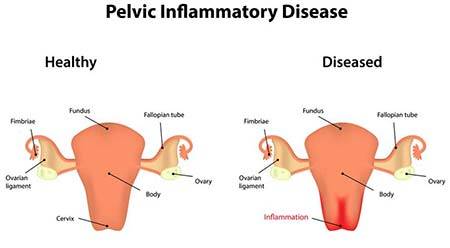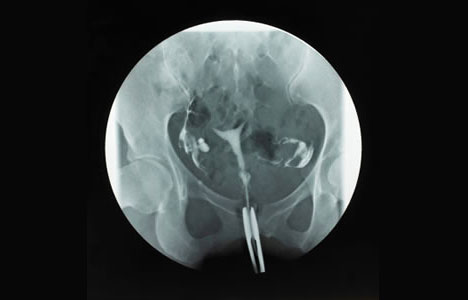Pelvic Inflammatory Disease
 Pelvic Inflammatory disease (PID) refers to an infection in the female reproductive organs. While any kind of infection can cause PID, the condition is most commonly a side effect of a sexually transmitted disease (STD) like gonorrhea or chlamydia.
Pelvic Inflammatory disease (PID) refers to an infection in the female reproductive organs. While any kind of infection can cause PID, the condition is most commonly a side effect of a sexually transmitted disease (STD) like gonorrhea or chlamydia.
Pelvic Inflammatory disease is a serious condition that, if caught early, can be successfully treated. However, untreated PID can also cause irreparable damage to your reproductive system and even though you may be able to thwart the spread of PID and stop the infection, PID can cause lasting damage to pelvic organs.
According to the Centers for Disease Control and Prevention, one out of eight women who contract pelvic Inflammatory disease has difficulty conceiving. Signs and symptoms of PID should always be evaluated with a thorough consultation and examination by a physician for an accurate diagnosis and treatment plan as well as careful follow up.
If PID is left untreated, it can even lead to infertility
Gynecologist in the Upper East Side of Manhattan Women’s Health & Wellness offer a comprehensive Obstetrics & Gynecology care for women of all ages. At our obgyn clinic of we provide a full range of gynecology services, from annual check-ups and routine pap smears to treatment of PID, and gyn procedures, surgeries performed in our office or in the hospital. Our state of the art Manhattan, New York gynecology facility equipped with a latest obgyn equipment.
Causes and Risk Factors
As mentioned, getting a sexually transmitted disease because of the lack of condom use and is the number one cause of pelvic inflammatory disease. Untreated STDs carry serious side effects that you shouldn’t ignore. In addition to reproductive repercussions, an untreated infection can prove fatal.
In addition lack of condom use, you’re at a greater risk of developing a PID if you:
- Start having sex before you turn 25 years old
- Have sex with someone who has multiple sex partners
- Have a history of PID and sexually transmitted diseases
Spreading Fast
While the infection may start in your vagina from contact with an infected partner, it can quickly spread to your ovaries. It can also lead to a uterus infection or a fallopian tube infection. Untreated, PID can lead to a host of complications. Scar tissue can form and fluid can build up, leading to abscesses (a buildup of bacteria usually confined to a small space), which can cause other inflammatory disorders and complications, such as:
- Increased risk for having an ectopic pregnancy, that is, a pregnancy outside of its normal location such as the fallopian tube or near the ovary
- Chronic pelvic pain and abdominal pain that can last for years
- Increased risk of infertility
- Increased risk of developing PID again
PID can usually be treated with oral antibiotics
The longer you have pelvic inflammatory disease before getting it treated, the more damage your reproductive organs endure. Complications can occur even after your symptoms go away if you haven’t completed the treatment prescribed for you. In addition to finishing all the medication you’ve been given, make sure your partner is treated for the STD that caused the PID or you risk re-infection.
Symptoms Are Sometimes Clear
Unlike other reproductive conditions like ovarian tumors or cysts, you usually have clear signs that something is amiss when you have a pelvic inflammatory disease. Though many of the PID symptoms mimic those of a sexually transmitted infection, you should seek medical treatment right away to prevent them from turning into pelvic inflammatory disease. All symptoms should always be evaluated with a thorough consultation and examination by a physician for an accurate diagnosis and treatment plan as it may be a symptom or sign of a serious illness or condition.
Symptoms most commonly associated with PID include:
- Fever
- Pain or burning while urinating
- Pain while having intercourse
- Abdominal pain
- Pelvic pain
- Irregular bleeding during your period
- Heavy discharge from your vagina with foul-smelling odor
Note that pelvic inflammatory disease and endometriosis are not related. Endometriosis is a condition that results in severe and excessive menstruation pain and bleeding. There’s no known cause for endometriosis, though many people wrongly attribute the condition to PID.
Infections, on the other hand, can quickly take their toll and lead to even more severe symptoms. Seek immediate emergency treatment by calling 911 if you experience the following or other concerning symptoms:
- Vomiting
- A fever in excess of 101 degrees Fahrenheit
- Fainting or other signs of shock
- Severe lower abdominal pains
Diagnosing PID

A pelvic exam may provide your obgyn doctor with clues that you have an inflamed ovary, which could easily be caused by pelvic inflammatory disease. During your visit with an OBGYN in NYC, clearly explain your symptoms, when they started and how severe they feel. It’s vital that you be honest about your sexual partners and sexual history to get a better diagnosis.
There isn’t a specific test for pelvic inflammatory disease, but in addition to a physical exam looking for obvious signs of infection, your obgyn doctor may:
- Take samples of the discharge for testing
- Test your urine and cervical cultures
- Perform an ultrasound to observe your reproductive organs
- Do a biopsy of the tissue in your endometrium or ovary lining
- Use a tiny lighted camera to perform a laparoscopy through a small incision on your abdomen to get an even closer look at your sexual organs to see if any are inflamed
Treatment Options
The very first line of defense against a PID is a combination of antibiotic medications, which you may receive at your first visit. After getting the results back from the various tests taken, your doctor may ask you to return to adjust the medicine to treat a specific infection. You’ll most likely be asked to return in about three days so your obgyn doctor can check to make sure the antibiotics are working.
Having your partner checked for signs of sexually transmitted infections also is a vital part of your treatment. It’s very possible that sexual partners won’t show any signs of infection and, without medical treatment, can re-infect you without even knowing it. It’s also strongly recommended that you abstain from any sexual contact until your treatment is complete, your partner’s treatment is complete and you’re both completely free of infection.
Hospitalization Is Rare
Most of the time, a PID can be successfully treated in the doctor’s office as long as you follow directions closely. If you are pregnant or not responding adequately to oral medications, you may need intravenous antibiotics. Rarely, surgery can be an option if the abscesses have formed and ruptured, creating additional, uncontrolled and dangerous bleeding. All treatment decisions should be made in conjunction with your physician.
Surgery also may become necessary if you don’t respond to any clear infection-related treatments. Midtown Manhattan gynecologist may question the presence of PID and suspect more serious complications that may require surgical intervention. As long as you maintain clear and frank communications with your OBGYN, you can stay up to date on your progress and any changes as they occur.
Important Reminder: This information is only intended to provide gynecology guidance, not definitive medical advice. Please consult ob/gyn doctor about your specific condition. Only a trained, experienced gynecologist can or certified gynecology specialist determine an accurate diagnosis and proper treatment.
Have questions? Schedule an appointment with New York City leading Gynecologist, Dr. Fernando Mariz, today.
Updated on Jun 26, 2020 by Dr. Fernando Mariz (Gynecologist), Manhattan Women’s Health and Wellness
Best-in-class
New York Gynecology Clinic
Manhattan Specialty Care in the Press

Call now to make an appointment with our highly rated Manhattan Gynecology doctors regarding your health. We look forward to seeing you!
book online now
(212) 378-9987
New York City Locations:
Manhattan Women's Health & Wellness (Upper East Side)
983 Park Ave, Ste 1D17
New York, NY 10028
(212) 389-1904
Manhattan Women's Health & Wellness (Midtown)
51 East 25th St, Ste 451
New York, NY 10010
(212) 677-7654
Manhattan Women's Health & Wellness (Union Square)
55 W 17th St, Ste 104
New York, NY 10011
(212) 378-9985